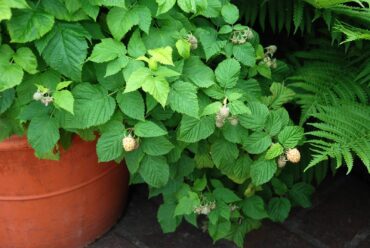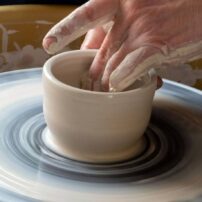
(Photo courtesy of MelindaMyers.com)
Have fun and enjoy picking fresh fruit right outside your door thanks to compact varieties you can grow in containers. Just clear some space on your patio, deck, balcony or front steps that receives at least six hours of sunlight and get busy planting.
Consider starting with strawberries. They provide seasonal interest with their white flowers, red berries and brilliant fall color. Day-neutral and everbearing strawberries produce fruit throughout the summer and grow well in strawberry pots, containers and hanging baskets. Place the containers where you can appreciate their beauty and easily harvest — and enjoy a few berries on your cereal, as an afternoon snack or atop your favorite dessert.
Include a few of the relatively new compact berry bushes suited to containers and small spaces. Raspberry Shortcake grows 2-3 feet tall and wide and is thornless, which makes harvesting a breeze. They produce a bumper crop on new plant growth each season.
Baby Cakes blackberry is another thornless, space-saving berry plant. Like Raspberry Shortcake, it grows 2-3 feet tall and wide and is thornless. The white flowers and tasty fruit that form on old growth make Baby Cakes a nice addition to any outdoor space.
Grow compact blueberries in pots, adding pretty flowers, edible fruit and great fall color to your patio, deck or balcony. Blueberries prefer moist, well-drained acidic soil that many of us do not have in our gardens but can provide these ideal conditions when growing in containers. You only need one plant to have fruit but growing two will more than double the harvest.
Use narrow and columnar dwarf apples as a living screen or vertical accent. The Urban Apple series, Spire apples, North Pole and Sentinel varieties are all suited to growing in containers and small spaces. The trees grow about 8-10 feet tall and only several feet wide. The trunk is loaded with short branches and lots of fruiting spurs for easy harvesting. You will need two different varieties of most apples, including these, for cross-pollination to occur and fruit to develop.
Grow your compact berry bushes in pots 12 to 16 inches in diameter and at least 10 inches deep. As the plants grow and mature, move them into larger, 20- to 24-inch containers. Your columnar apples will appreciate a bigger container that is 20 inches wide and deep.
Use pots with drainage holes and fill them with a quality potting mix. Check soil moisture daily and water thoroughly whenever the top few inches of soil are starting to dry. Reduce ongoing maintenance by incorporating an organic moisture-retaining product like Wild Valley Farms wool pellets into the potting mix. This sustainable product reduces watering by up to 25% and increases air space for healthier growth.
Supplement the nutrients in Wild Valley Farms wool pellets as needed with a low-nitrogen, slow-release fertilizer and eliminate weekly fertilization. Add the slow-release fertilizer soon after planting and again mid-season if needed. Don’t fertilize in late summer as that can stimulate late-season growth that can be damaged in winter.
Those gardening in cold climates will need to provide extra winter protection. Insulate the roots by grouping plants together and surrounding them with bales of straw, bags of potting mix or similar materials. Or move plants to an unheated garage for winter and water whenever the soil is thawed and dry.
Another option is to grow these plants in nursery pots and set them in decorative containers for summer. When winter arrives, move the potted plants out of the decorative containers and sink the nursery pots in a vacant part of the garden. Lift the plants out of the ground in spring and set them back in their decorative containers for the growing season.
As you master these fruit plants, and if space allows, expand your small-scale orchard to include citrus, figs, dwarf cherries, plums and peaches. You’ll enjoy the flowers, shade and, of course, the tasty fruit.
























